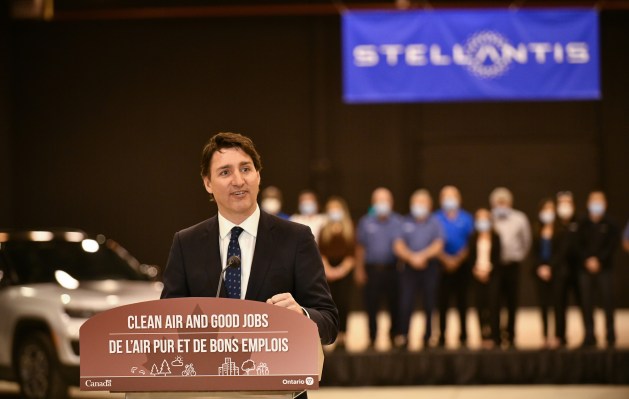Stellantis will spend $2.8 billion (CAD $3.6 billion) to increase production of electric vehicles at two of its Canadian plants, the company said on Monday. The funding is a portion of the $35.5 billion Stellantis dedicated to electric vehicles and new software over the next year in its push to move away from internal combustion engines and be carbon net zero by 2038.
Stellantis North America chief operating officer Mark Stewart, alongside Canadian Prime Minister Justin Trudeau, announced the overhaul of the Windsor and Brampton, Ontario facilities during an event at the automaker’s Automotive Research and Development Center in Windsor.
About a third of the fresh funds will come from the Canadian government and the Ontario government, which plan to invest up to $410.7 million (CAD $529 million) and $398 million (CAD $513 million), respectively, alongside Stellantis, a signal that Canada is keen to support domestic production of EVs at a time when advancing climate change initiatives coincide with increasingly dire supply chain constraints.
“Today’s deal on made-in-Canada electric vehicles is yet another investment in our workers and in our future,” said Prime Minister Trudeau at the event. “We’re building a world-class Canadian auto industry, an innovative economy and a clean, strong future for everyone. This is what a healthy environment and a healthy economy looks like.”
The funding will add more than 650 engineering jobs to the Windsor R&D center, according to Stellantis. The company also said an additional 2,500 jobs will be created at the Stellantis-LG Energy Solution joint battery venture, which was announced in October last year. At the time, Stellantis said only that its new factory would be built in North America, but it’s now clear the automaker has its sights set on Ontario.
Stellantis, which owns a range of vehicle brands, including Alfa Romeo, Fiat, Chrysler, Dodge, Jeep, Ram and Peugot, has not yet said which brands would be affected; however, it’s likely there will be continued work on the Chrysler Pacifica Hybrid and other Chrysler EVs, as well as some electrified Dodge cars.
The Windsor factory currently produces the Pacifica, as well as the Chrysler Voyager and Grand Caravan, the latter for the Canadian market only. At CES this year, Stellantis said Chrysler, best known for its minivans and being a family-friendly brand, will become all-electric by 2028. At the same time, the automaker unveiled its Airflow Concept, an all-wheel-drive electric SUV.
Meanwhile, the Brampton facility is home to the production of the Chrysler 300 and the Dodge Challenger and Charger, all three of which are on their way out. Dodge has said it plans to launch an electric muscle car, the eMuscle, in 2024.
Retooling at Windsor is expected to begin in 2023, and retooling and modernization at Brampton in 2024, with production at the latter reesuming in 2025, complete with an “all-new, flexible architecture to support the company’s electrification plans,” the company said in a statement.
Stellantis said it would announce at a later date which brands will be affected by the fresh funds. Regardless, we can expect the vehicles produced in those factories to feature the automaker’s new software technology, from which Stellantis has said it plans to generate $22.5 billion annually. All new Stellantis vehicles by 2024 will feature the automaker’s platforms, including the “STLA Brain,” a cloud-connected technology that allows for over the air software upgrades; the “SmartCockpit,” a platform built with Foxconn that delivers applications like navigation, voice assist, e-commerce marketplace and payment services; and “AutoDrive,” developed with BMW to deliver automated driving features.
For those who want a high-tech hit now, Pacificas of this model year can upgrade to get an Amazon Fire TV to stream or download shows and movies or get information from Alexa, a partnership that will also hit millions of Stellantis vehicles by 2024.
Through its 14 brands, Stellantis currently has 29 electrified models on sale globally. By the end of the decade, the automaker hopes to reach 75 BEVs globally, 25 of which will target the U.S. market. Recently, Stellantis revealed its first-ever fully electric Jeep SUV, which is expected to launch next year, as well as its new Ram 1500 BEV pickup, which is expected for 2024.
